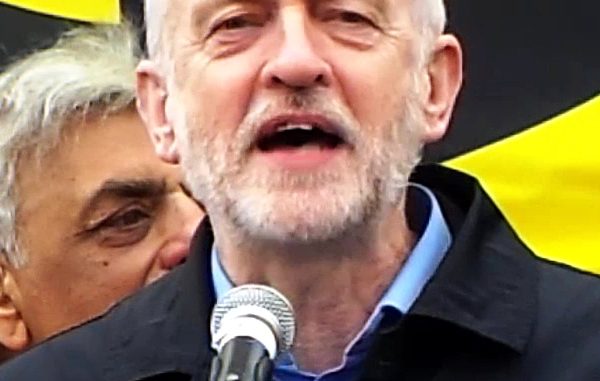
Debate exposes Labour as two parties
The UK parliamentary debate on the replacement of the Trident nuclear weapons system was another illustration of the fact that the Labour Party is two irreconcilable parties in one, heading for an inevitable split. For parliamentary purposes the debate was completely unnecessary, not committing the government to any new action. But it had been tabled by the Tories as a means of aiding the capitalist establishment's campaign to unseat Jeremy Corbyn as Labour leader, almost certainly in collaboration with the Parliamentary Labour Party (PLP) Blairite majority.
Even last autumn, just weeks after Corbyn's leadership election victory, The Times (12 October) was reporting that "senior Labour figures were pushing for an early vote" on Trident as part of a 'destabilisation strategy', to prepare the ground for a leadership challenge. The sight on Monday of backbench 'Labour' MPs queuing up to read their scripted attacks on Corbyn would have fooled no one that this was anything other than a coordinated campaign.
No case for Trident
There was nothing new in their arguments or those of the Tories justifying the enormous expenditure on weapons of mass destruction they were proposing. Tory prime minister Theresa May's main argument was that "it is impossible to say for certain that no extreme threats will emerge in the next 30 or 40 years to threaten our way of life" and that therefore new nuclear weapons were a 'necessity'. Labour leadership challenger Owen Smith, a former member of the Campaign for Nuclear Disarmament, also said "I think the world has got more volatile" so "we've got to stick to what we've got and renew it". But we know something about the future and one certain 'threat to our way of life'. If global warming hasn't been contained 'in the next 30 or 40 years' there inevitably will be intense conflicts for resources in the ecologically ravished world that will exist then. But a new nuclear weapons system is of little use in fighting climate change!
Jeremy Corbyn highlighted the massive and escalating estimated costs of replacing the four nuclear submarines, £31bn with a £10bn 'contingency' fund. Then there is the operational and maintenance costs over the missile system's 30-year lifespan. Whether these come in at the lower or upper estimate of £167bn or £205bn this is a far greater amount than the investment in renewable energy that would be necessary to more than halve Britain's carbon emissions by 2030. For these reasons alone a real socialist party would have voted against Monday's Trident motion. But only 47 Labour MPs joined Jeremy Corbyn in voting against while 140, including leadership challengers Angela Eagle and Owen Smith, joined with the Tories instead.
Trident part of the leadership challenge
Making the socialist case against Trident must be part of Jeremy Corbyn's reelection campaign. The general secretary of the GMB union, Tim Roache, criticised Jeremy Corbyn for not supporting Trident renewal and announced a membership ballot on whether the union "still believed Corbyn was the right person to lead the party". Meanwhile, Labour's deputy leader Tom Watson, speaking on the World At One, made an open appeal to Unite members to challenge the union general secretary Len McCluskey's support for Jeremy Corbyn, "who will be voting against the Trident programme tonight which will put many defence workers in Unite out of their jobs if he gets his way". He forgot to mention that, if Jeremy Corbyn 'got his way', Labour would be committed to a defence diversification programme that, if it was based on nationalisation of the arms manufacturing, shipbuilding and related industries, would guarantee the jobs and conditions of the workers involved, only now in socially useful production. But this shows that the procapitalist Labour right organising to unseat Jeremy Corbyn can only be effectively answered, not by seeking 'compromise' with them, but by counterposing clear socialist policies including democratic public ownership
Special financial appeal to all readers of socialistworld.net |
Support building alternative socialist media Socialistworld.net provides a unique analysis and perspective of world events. Socialistworld.net also plays a crucial role in building the struggle for socialism across all continents. Capitalism has failed! Assist us to build the fight-back and prepare for the stormy period of class struggles ahead. Please make a donation to help us reach more readers and to widen our socialist campaigning work across the world. |
Donate via Paypal |
| M | T | W | T | F | S | S |
|---|---|---|---|---|---|---|
| 1 | 2 | 3 | ||||
| 4 | 5 | 6 | 7 | 8 | 9 | 10 |
| 11 | 12 | 13 | 14 | 15 | 16 | 17 |
| 18 | 19 | 20 | 21 | 22 | 23 | 24 |
| 25 | 26 | 27 | 28 | 29 | 30 | 31 |


Be the first to comment